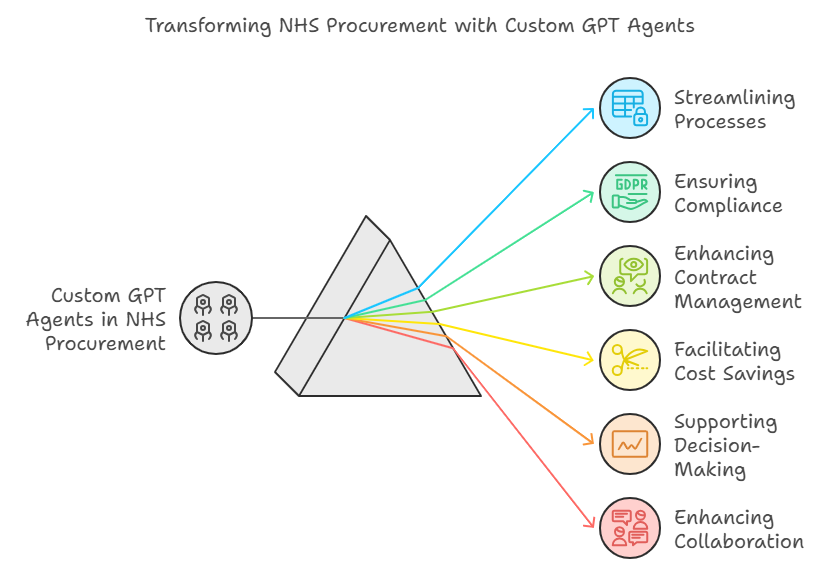The healthcare sector, particularly the National Health Service (NHS) in the United Kingdom, operates within a complex procurement environment driven by rigorous compliance standards, budgetary restrictions, and the need to source high-quality products and services. The addition of custom GPT (Generative Pre-trained Transformer) agents, tailored specifically to the needs of health procurement, has the potential to transform the way NHS procurement professionals work. Custom GPT agents are designed to harness artificial intelligence (AI) capabilities to manage repetitive tasks, streamline processes, enhance decision-making, and promote overall efficiency.
This article explores the substantial benefits that custom GPT agents can offer to the UK health procurement landscape, highlighting how they can assist procurement professionals in creating compliant frameworks, managing contracts, and driving cost savings. It will also delve into the various tools and services that these AI agents could provide to support NHS procurement teams in achieving these goals.

1. Streamlining Procurement Processes
The UK NHS is one of the largest purchasers of goods and services, and as such, it faces a unique set of challenges in ensuring that procurement is both efficient and compliant with statutory guidelines. Custom GPT agents can streamline procurement by automating and optimising various aspects of the process:
a) Automated Data Entry and Document Management
Procurement processes require extensive documentation, from supplier bids to compliance certifications and contract terms. GPT agents can automate data entry, reducing the time and risk associated with human error. They can also handle large volumes of documentation, storing, categorising, and retrieving documents as needed. This can be invaluable in contract lifecycle management, as agents can pull up relevant documents, flag upcoming expirations, and even identify documents that require updates to remain compliant.
b) Supplier Evaluation and Selection
GPT agents can assist procurement professionals by automatically analysing supplier responses to requests for proposals (RFPs), tenders, and other procurement documents. By reviewing supplier qualifications, pricing models, and compliance history, these agents can rank and suggest suppliers based on predefined criteria. This can significantly reduce the time and effort required in supplier selection, allowing procurement professionals to make faster, more informed decisions.
c) Demand Forecasting and Inventory Optimisation
Using historical data and predictive modelling, GPT agents can help forecast demand for specific goods and services, allowing the NHS to better manage inventory levels. This is particularly important in healthcare procurement, where supply chain disruptions can impact patient care. By anticipating needs and adjusting procurement strategies accordingly, these agents can help prevent stockouts or over-purchasing, ultimately leading to cost savings.
2. Ensuring Compliance with Procurement Regulations
Compliance with regulatory standards is a fundamental concern in NHS procurement. Non-compliance not only jeopardises patient care but also exposes organisations to potential legal consequences. Custom GPT agents can play a significant role in maintaining compliance:
a) Real-Time Regulatory Updates and Alerts
Procurement regulations in the UK are subject to change, and keeping up with these changes is critical for compliance. Custom GPT agents can monitor regulatory sources, such as the UK government’s procurement guidelines and NHS procurement policies, providing real-time updates and alerts when changes occur. This ensures that procurement professionals are aware of the latest regulations and can make informed decisions that comply with current standards.
b) Automated Compliance Checks
GPT agents can be programmed to conduct automated compliance checks across all stages of procurement. For example, they can verify that supplier contracts meet NHS procurement guidelines or that purchasing decisions align with relevant statutory frameworks, such as the Public Contracts Regulations 2015. These automated checks reduce the risk of non-compliance and allow procurement professionals to focus on more strategic aspects of their role.
c) Monitoring of Framework Agreements
Framework agreements allow NHS organisations to procure goods and services from pre-approved suppliers under set terms, which is both time-efficient and compliant. GPT agents can help manage these frameworks by monitoring agreement terms, ensuring they remain up-to-date, and flagging any necessary updates. They can also identify new frameworks or changes in existing agreements, helping procurement professionals capitalise on available options.
3. Enhancing Contract Management and Supplier Relationships
Managing contracts and supplier relationships is crucial for maintaining supply chain stability and securing favourable terms. GPT agents can offer a range of services that streamline contract management and improve supplier relationships:
a) Contract Lifecycle Management
The lifecycle of a contract involves various stages, including negotiation, approval, monitoring, renewal, and termination. GPT agents can track contracts through each stage, ensuring that deadlines are met and renewals are addressed in a timely manner. They can also identify potential issues, such as terms that might lead to cost overruns, and suggest solutions to mitigate risks.
b) Supplier Performance Monitoring
GPT agents can evaluate supplier performance using pre-set metrics, such as delivery time, quality of goods, and adherence to contractual terms. By identifying trends and potential issues, these agents can provide procurement professionals with insights into supplier reliability. This information is invaluable in negotiations, allowing the NHS to make data-driven decisions about whether to renew or terminate supplier contracts.
c) Dispute Resolution and Risk Management
In cases where contractual disputes arise, GPT agents can assist by analysing the terms of the contract, assessing relevant regulations, and suggesting possible resolutions. Additionally, they can perform risk assessments based on supplier history, compliance records, and external factors such as geopolitical or economic conditions. By identifying potential risks early on, these agents empower procurement professionals to mitigate or avoid issues before they escalate.
4. Facilitating Cost Savings and Financial Efficiency
Cost savings are a primary concern in NHS procurement, as budget constraints demand efficient spending. Custom GPT agents can support cost-saving initiatives through several mechanisms:
a) Price Comparison and Market Analysis
GPT agents can gather pricing information from various sources, enabling procurement professionals to compare prices across suppliers. By analysing market trends and identifying suppliers offering lower prices, agents can help secure more favourable terms. This reduces spending on goods and services and ensures the NHS is getting the best possible value for money.
b) Identifying Savings Opportunities
Using predictive analytics, GPT agents can identify potential savings opportunities by examining purchasing patterns and suggesting more cost-effective alternatives. For example, they might recommend consolidating orders for bulk discounts or switching to suppliers with more competitive pricing. These insights enable procurement professionals to maximise cost savings without compromising on quality.
c) Budget Tracking and Spend Analysis
GPT agents can monitor budgets in real time, alerting procurement teams when they approach or exceed spending limits. They can also conduct spend analysis, breaking down costs by category, supplier, and department. This visibility allows NHS organisations to identify areas of excessive spending and implement corrective measures, contributing to long-term financial sustainability.
5. Supporting Procurement Decision-Making through Data-Driven Insights
One of the most significant advantages of custom GPT agents is their ability to provide data-driven insights that support decision-making:
a) Data Collection and Analysis
GPT agents can collect and analyse vast amounts of data from both internal and external sources, including market data, supplier records, and financial reports. By providing procurement professionals with insights into factors such as pricing trends, supplier performance, and regulatory changes, agents enable more informed decision-making.
b) Scenario Modelling and Strategic Planning
Procurement professionals often need to make strategic decisions based on potential future scenarios, such as supplier shortages or changes in demand. GPT agents can simulate various scenarios, allowing professionals to assess potential outcomes and make proactive choices. This capability is invaluable for long-term planning, as it helps the NHS anticipate and respond to changes in the procurement landscape.
c) Tailored Recommendations
Custom GPT agents can be programmed to offer tailored recommendations based on the specific needs of an NHS organisation. For example, they might suggest suppliers that are known for high-quality medical equipment, or recommend purchasing strategies that align with organisational priorities. By offering personalised insights, these agents enhance decision-making and help procurement professionals achieve their goals.
6. Enhancing Collaboration and Knowledge Sharing
Collaboration is essential in procurement, as teams need to work together to coordinate purchasing decisions and ensure compliance. GPT agents can enhance collaboration and knowledge sharing in several ways:
a) Centralised Knowledge Repositories
GPT agents can serve as centralised repositories for procurement-related information, including supplier details, contract terms, compliance guidelines, and best practices. By making this information easily accessible, agents facilitate knowledge sharing across procurement teams, helping professionals stay informed and work together more effectively.
b) Real-Time Communication and Task Management
Custom GPT agents can be integrated with communication platforms, allowing procurement teams to stay connected and track tasks in real time. They can also provide status updates on procurement processes, ensuring that team members are aware of important developments. This reduces the risk of miscommunication and helps teams work more efficiently.
c) Training and Onboarding
For new procurement professionals, GPT agents can serve as valuable training tools. They can answer questions, provide guidance on compliance issues, and offer insights into NHS procurement practices. This helps new hires get up to speed quickly, reducing the learning curve and enabling them to contribute to procurement efforts sooner.
Custom GPT agents have the potential to revolutionise the UK health procurement landscape, offering a wide range of tools and services that support procurement professionals in creating compliant frameworks, managing contracts, and achieving cost savings. By streamlining processes, ensuring compliance, enhancing contract management, facilitating cost savings, supporting decision-making, and promoting collaboration, these agents empower NHS procurement teams to meet their goals more effectively.
The adoption of custom GPT agents aligns with the NHS’s commitment to innovation and efficiency, allowing procurement professionals to focus on strategic initiatives while delegating repetitive tasks to AI. As the UK healthcare sector continues to evolve, the integration of AI-driven solutions like custom GPT agents will play an increasingly critical role in supporting NHS organisations, ultimately contributing to better patient outcomes and a more sustainable healthcare system.
The information presented in this article is based on publicly available sources and general knowledge at the time of writing. While every effort has been made to ensure the accuracy of the content, there may be inaccuracies or changes in circumstances that affect the validity of the information. This article does not endorse any specific company, product, or application, and should not be construed as legal, professional, or technical advice. Readers are encouraged to seek further guidance from relevant experts or official sources.








